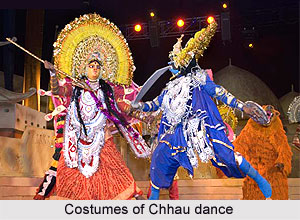The costumes and artificial limbs
It is not definitely
known what was the nature of costumes that were used during the formative
period of the dance about two hundred years ago. Nothing can be summarised on
this point from the costumes that are used to-day though they have not yet been
thoroughly modernised in any way. From the statement recorded from the older
section of the people of the area of Baghmundi it is learnt that the costumes
were different from what it is to-day. If that is so, then it must be admitted
that there has been a gradual evaluation as far as the costumes are
concerned.
More than one century
ago, when the Baghmundi Raj family used to hold the annual dance festivals, the
member of the family used to supply costumes themselves to the dancers and thus
a model of costumes for this purpose was set by them.
The costumes that are
used to-day have some special features not commonly met with in any other
art-form in the area or elsewhere in Bengal. They may be described as follows. A
piece of most ordinary trouser made most economically of cloths of different
colours for gods and demons with stripes, each being about six inches apart, is
used by the heroes, both gods and demons, in the course of the dance. Some
cases the divine characters possess some additional limbs like hands, heads and
so on. Goddess Durgais ten-handed, Ganesha
and Kali are four handed each and Ravana is
ten-headed. Additional limbs are supplied which are made of wood and adjusted in
the human body.
There are certain divine
characters like Lord Shiva, Lord Ganesh and
a few others who have other forms of lower garments. Siva would put on a piece
of cloth representing a tiger's skin covering only up to his knees and Ganesha
would put on, instead of a trouser, a piece of cloth in the fashion of a
Bengali gentleman. The idea of Ganesha's putting on a piece of cloth in the
style of a Bengali gentleman has been borrowed from the image of the goddess
Durga. Siva, who has to dance as vigorously as other characters, would never
sacrifice his loin cloth in the course of his dance.
Women characters are rare in Chhau dance. Goddess Kali appears with a very tight black trouser without any stripes, resembling her own skin colour. This is the only instance of a woman's character putting on men's costume. Kali dances Tandava or men's dance with a vigorously and wild excitement resembling and even surpassing men's characters. Other divine women characters’ use Bengali women's cloth according to their status and rank. Durga wears a magnificent ornamental crown on a deep red base. Demonesses wear unconventional cloths or even short trousers or half pants made of deep black coloured cloth of the most ordinary quality. The exposed parts of the bodies are dyed with jet black coloured powder and sometimes anoint their bodies with liquid colours in order to give a realistic look of the characters. There are characters like sages and Brahmins who put on loin cloth dyed in saffron colour. The upper parts of the bodies of the dancers have more elaborate costumes both divine and demonic. Each character wears an embroidered jacket made of either a fine or an ordinary velvet cloth. Embroidery is done by hands with silky thread and all sorts of cheap articles of attractive nature like tinsel and imitation pearls and others. There are beautiful designs at the back and at the two sides of the front or the breast. Minor characters like hunters, sages, ascetics and Brahmins keep the upper part of their bodies bare or wrapped in some cloth which is white or saffron coloured according to the situation. At times the hunters wear jackets with feathers of birds stuck all over in order to give a more realistic colour to the character. The soldiers are minor characters but they wear embroidered jackets.
Women characters are rare in Chhau dance. Goddess Kali appears with a very tight black trouser without any stripes, resembling her own skin colour. This is the only instance of a woman's character putting on men's costume. Kali dances Tandava or men's dance with a vigorously and wild excitement resembling and even surpassing men's characters. Other divine women characters’ use Bengali women's cloth according to their status and rank. Durga wears a magnificent ornamental crown on a deep red base. Demonesses wear unconventional cloths or even short trousers or half pants made of deep black coloured cloth of the most ordinary quality. The exposed parts of the bodies are dyed with jet black coloured powder and sometimes anoint their bodies with liquid colours in order to give a realistic look of the characters. There are characters like sages and Brahmins who put on loin cloth dyed in saffron colour. The upper parts of the bodies of the dancers have more elaborate costumes both divine and demonic. Each character wears an embroidered jacket made of either a fine or an ordinary velvet cloth. Embroidery is done by hands with silky thread and all sorts of cheap articles of attractive nature like tinsel and imitation pearls and others. There are beautiful designs at the back and at the two sides of the front or the breast. Minor characters like hunters, sages, ascetics and Brahmins keep the upper part of their bodies bare or wrapped in some cloth which is white or saffron coloured according to the situation. At times the hunters wear jackets with feathers of birds stuck all over in order to give a more realistic colour to the character. The soldiers are minor characters but they wear embroidered jackets.




Comments
Post a Comment